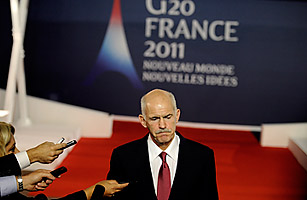By JOANNA KAKISSIS / ATHENS For once, the drama didn’t unfold during the raucous antiausterity protests on the streets outside Parliament. On Wednesday, the drama inside the Greek Parliament was so charged that it kept Greeks glued to the news, anxious that, by day’s end, they wouldn’t have a leader, a bailout plan or even a currency.
Prime Minister George Papandreou is still running the country, but his days — his hours even — could be numbered. He faces a crucial confidence vote in Parliament on Friday, and it’s not clear whether he has the votes to survive it.
During a debate Wednesday on the confidence vote, he also told lawmakers that he was open to all options, including leaving his post as Prime Minister to help build a coalition government and pave the way for snap elections. “I never excluded any topic from the discussion, not even my own position,” Papandreou said.(See how Papandreou’s move upsets Greece.)
Papandreou also scrapped his controversial idea to hold a public referendum on the bailout deals hammered out by the European Union. The idea so angered members of his own party that they pressured him to resign. One lawmaker, Milena Apostolaki, left PASOK, Papandreou’s socialist party, and called the referendum plan “divisive.”
The referendum had, indeed, caused a maelstrom after Papandreou introduced it earlier in the week. He had hoped the public vote — the first since 1974, when Greece voted to abolish the monarchy — would give Greeks a direct voice in the fate of their country. Papandreou had reportedly grown distressed that austerity was hurting Greeks and that the strain of the last year was tearing the country’s social fabric.
But instead of welcoming the referendum as a sign of direct democracy, Greeks panicked. Many worried about the repercussions, especially after German Chancellor Angela Merkel and French President Nicolas Sarkozy demanded that it be a question about whether Greece wants to stay in the euro zone.(See photos of a general strike in Athens.)
“I haven’t been able to sleep since he announced this,” says Yiannis Tsarmougelis, an economics professor at the University of the Aegean. “I just don’t understand the motive, why he would endanger the country’s standing in Europe like this. It seems so reckless to me.”
The call for a referendum added even more uncertainty at a time when Greeks can’t handle it, says Nikos Paratsiokos, 31, a policy researcher. “We just don’t know what’s going to happen from minute to minute. We need Europe, and now I’m worried the Europeans are going to lose trust in us now and think we’re the poor, backward cousins who can’t manage our own affairs.”
Antiausterity activists said the referendum should have been held last year, before Greece signed any agreements with the European Union and International Monetary Fund (IMF). “What’s the point of having this now?” asked Christos Hatzis, a 29-year-old activist and radio-show host. “I don’t think it’s a genuine move. I don’t trust Papandreou.”
Euro-zone leaders had balked at the idea — and were not shy about making those feelings clear. Merkel and Sarkozy were furious enough with Papandreou to summon him Tuesday to Cannes, France, for an emergency meeting on the sidelines of the G-20 conference. After the meeting, Merkel and Sarkozy said it had to be a referendum on whether Greece wanted to stay in the euro zone. It would have to be held by Dec. 4, she said, adding that the euro must be safeguarded at all costs.
By Wednesday morning, the E.U. and IMF said they wouldn’t give Greece its latest tranche of money, some $11 billion, until after the referendum. Frightened at the prospect of losing billions in bailout money, and letting the nation default on its debt, several members of the ruling PASOK party abandoned Papandreou. By the time he called an emergency cabinet meeting for noon, Finance Minister Evangelos Venizelos and even parliamentary deputies close to Papandreou said they wouldn’t support the referendum.(Read “Should Greece Ditch the Euro?”)
Members of PASOK, including Education Minister Anna Diamantopoulou, talked openly about a coalition government that would help Greece see through the bailout program. Greek media floated two names as transitional Premier: former Prime Minister Costas Simitis, who shepherded Greece into the euro zone, and former central banker Lucas Papademos. The coalition government would hold the country together until new elections could be organized.
Encouraged by talks that Papandreou would step down, Antonis Samaras, who leads the main opposition, center-right New Democracy party, said he would support the latest bailout deal, which includes a $138 billion write-down of Greek debt but sticks to austerity measures. Samaras, who used to be Papandreou’s college roommate but is now his fiercest political critic, has refused to vote for any bailout packages in Parliament.
Buoyed by Samaras’ change of heart on the bailout vote, Papandreou said he was hoping to talk to opposition leaders about forming a coalition government. Instead, Samaras showed up to a parliamentary debate enraged. Samaras called Papandreou a liar and said he was blackmailing the country. “He no longer has credibility inside or outside the country,” Samaras told Parliament. “He must resign immediately.” He walked out of the confidence vote debate, followed by New Democracy’s deputies.(See if the Greek cuts have gone too far.)
Papandreou may survive Friday’s confidence vote, but he has signaled that he will step down as Premier afterward and negotiate a transitional government. It will not be an easy step for Papandreou, whose father and grandfather were also Premiers. His father, Andreas, founded PASOK, and the Papandreous are a storied dynasty, something akin to the Kennedys of Greece.
The 59-year-old Papandreou, a quiet, Minnesota-born sociologist who often seems out of place in the populist fight club of Greek politics, signaled that he was ready to walk away. “I am not tied to a particular post,” he said. “I am not interested in being re-elected but just in saving the country.”









